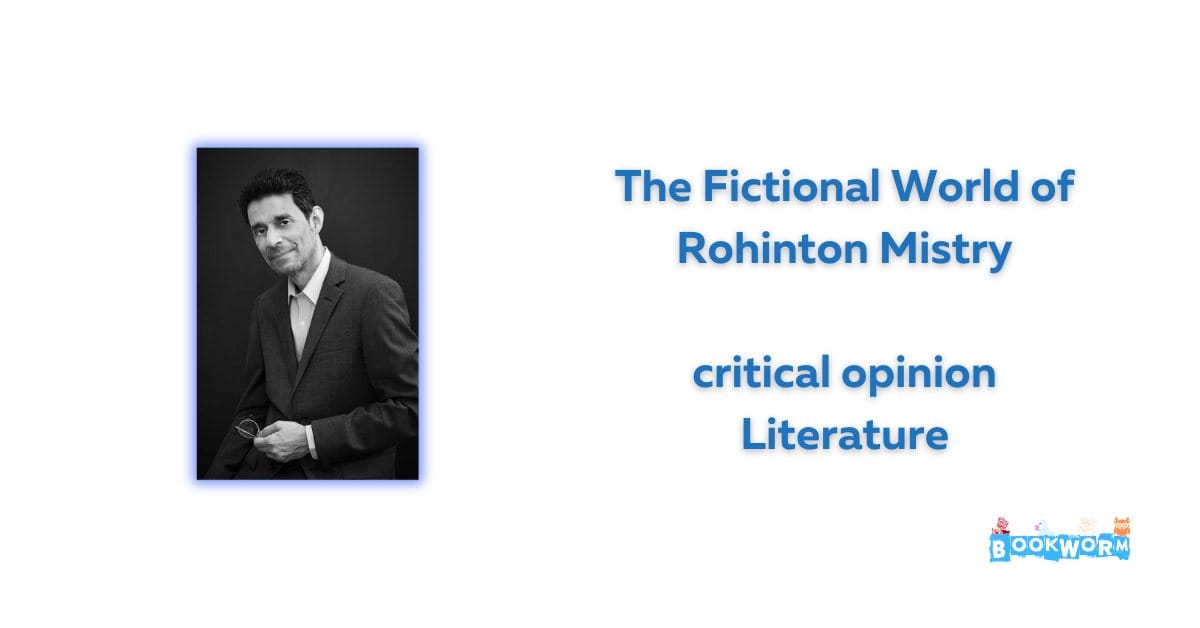Among the constellation of Indian novelists writing in English, Rohinton Mistry stands apart—not only for his craftsmanship but also for the solemn depth with which he engages with the human condition. Where others flirt with satire, experiment with myth, or elevate the lyricism of prose, a commitment to the sober, meticulous representation of suffering and endurance defines Mistry’s fiction. He neither mythologises India nor caricatures it. Instead, he dwells in its labyrinthine social inequalities, chronicling lives that seem both ordinary and epic in their despair. It is in this serious, almost reverent attention to the fragility of life that one begins to grasp the unique features of Mistry’s narrative universe.
Born in Bombay in 1952 and having immigrated to Canada in the late 1970s, Mistry inhabits a dual sensibility: geographically distanced from India, yet imaginatively entrenched in its history, politics, and urban sensibilities. This exilic position does not manifest as alienation in his fiction but rather as a persistent act of return. His novels—Such a Long Journey (1991), A Fine Balance (1995), and Family Matters (2002)—reveal a writer who has never left the psychological space of Bombay. His stories are not just about a city or a country; they are about the long residues of colonial injustice, the slow violence of poverty, and the intimate disruptions within families and communities.
One of the foremost characteristics of Mistry’s fiction is its emphasis on the ordinary. His protagonists are often middle-class, marginalised, or destitute individuals, caught within political upheaval and economic hardship. Their resistance is not of the revolutionary kind, but rather quietly stoic, rooted in day-to-day negotiations with fate. In A Fine Balance, for instance, four characters from drastically different social backgrounds come together during the Emergency declared by Indira Gandhi in the mid-1970s. The novel’s strength lies not merely in capturing the horror of the period but in the way it maps the erosion of individual dignity under authoritarian governance. Mistry paints with a realist’s palette: the descriptions are detailed, the narrative slow and deliberate, and the structure almost Victorian in its expansiveness. Yet this deliberate pace is not ornamental. It mirrors the drudgery and unrelenting pressure under which the lives of his characters unfold.
What also distinguishes Mistry is his refusal to be seduced by the exotic. Unlike several diasporic writers whose depictions of India seem tailored for Western readerships—filled with mysticism, culinary metaphors, and spiritual dilemmas—Mistry remains firmly unsentimental. There is neither spectacle nor flamboyance in his India. Instead, there are broken typewriters, amputated limbs, suffocating tenements, and political corruption. In this respect, he aligns more closely with writers like Saadat Hasan Manto or Kamala Markandaya, whose works foreground the lived experience of systemic degradation. Mistry’s India is a hard place to love, and he never attempts to make it otherwise.
And yet, for all the mastery of form and political acuity, Mistry’s fiction does not escape critique. While he excels at rendering pain with an almost sacred seriousness, one might argue that this very emphasis becomes limiting. There is, at times, an excess of suffering, an overwhelming density of despair that risks turning tragedy into a static aesthetic. In his review of A Fine Balance, literary critic and poet Alok Mishra makes a striking observation that encapsulates this concern: “I guess Rohinton Mistry might have mistaken pain for something timeless. It’s not. Hope, not pain, is timeless. In A Fine Balance, we find hope confined and battered in isolation. Pain, at the same time, was scattered everywhere in an unjust ratio.” This comment encapsulates the growing sentiment among contemporary readers who find Mistry’s fiction unrelentingly grim, even if brilliantly written.
Read this critical assessment of his writings: Rohinton Mistry
Indeed, unlike Amitav Ghosh, whose historical epics also confront human suffering but leaven it with a sense of discovery, adventure, and occasionally spiritual insight, Mistry’s canvas offers no such reprieve. Nor does he share the comedic or ironic tones found in the novels of Salman Rushdie or Arundhati Roy. While these authors experiment with form and voice, interspersing postmodern playfulness into their narratives, Mistry is largely traditional. His fidelity to realism borders on devotion. He believes in the narrative voice as an ethical act, a stabilising presence amid the chaos he depicts. But in a literary culture increasingly drawn to hybridity, non-linear storytelling, and metafiction, Mistry’s style can feel solemnly anachronistic.
Moreover, while the thematic preoccupation with suffering evokes the works of Leo Tolstoy and Fyodor Dostoevsky, Mistry’s vision lacks the metaphysical or philosophical arc that characterises the Russian masters. His characters seldom philosophise; they endure. They seldom rebel; they adapt. Even when confronted with the most harrowing experiences—loss of limbs, loss of home, betrayal by state and kin—Mistry’s characters rarely undergo internal transformations. Their virtue is their ability to survive, not to transcend. This ethical realism, while admirable, can also exhaust the reader. As Mishra poignantly notes, “the everyday readers seldom cared about A Fine Balance like they do for Amitav Ghosh these days or did for R.K. Narayan or Raja Rao in yesteryears.” It is a statement that points not merely to a change in readership preferences but to the necessity of aesthetic evolution.
Still, what cannot be denied is that Mistry is a master of prose. His language is never flamboyant, but it is beautifully controlled. The tone is always respectful of the subject, never reducing pain to spectacle. The metaphors are sparse but effective, often rooted in physicality rather than abstraction. His narrative voice possesses a gravitas reminiscent of George Eliot or Thomas Hardy, one that is more concerned with moral consequences than with linguistic acrobatics. In this regard, he restores dignity to the novel as an ethical form, a conduit for empathy rather than entertainment.
Read a review of A Fine Balance by Rohinton Mistry
Also remarkable is Mistry’s ability to evoke the Parsi community of Bombay with tenderness and precision. This minority community, often overlooked in Indian English fiction, is central to his work, not merely for representational purposes but as a microcosm through which larger themes of identity, displacement, and resilience are explored. The meticulous documentation of rituals, familial relations, and community hierarchies provides a cultural texture that enriches his narratives without ever turning into anthropological detachment.
If Mistry’s contribution to Indian English fiction seems austere in its thematic concentration, it is also singular in its ambition. He is not a writer one turns to for solace or delight, but for confrontation with reality in its starkest forms. His novels are literary acts of mourning, elegies for a country that continues to betray its most vulnerable citizens. While his fiction may not appeal to all, it possesses a moral clarity that demands attention. In times when literature often escapes into fantasy, nostalgia, or fashionable cynicism, Mistry’s realism is both a burden and a beacon.
To dismiss his work as outdated would be to misunderstand the depth of its vision. However, approaching it uncritically would be to deny its limitations. Perhaps, as Alok Mishra suggests, Mistry has mistaken pain for timelessness. Yet, in doing so, he has also preserved something undeniably authentic: a literary world that bears witness without flinching. His novels ask us not merely to read but to remember, not merely to observe but to feel, and above all, not to forget that endurance itself can be a form of rebellion.
In the grand tapestry of Indian English fiction, where diversity of voice and vision is celebrated, Rohinton Mistry holds a unique place. He may not dazzle with linguistic innovation or with narrative pyrotechnics. But he chisels human pain into prose with such conviction that one cannot help but pause, if not to admire, then at least to reflect.
Rajiv for BookWorm Reviews
..




